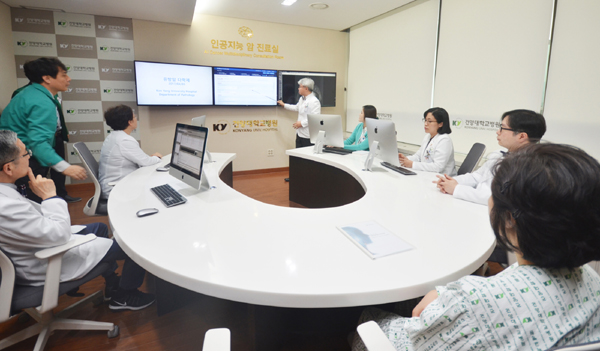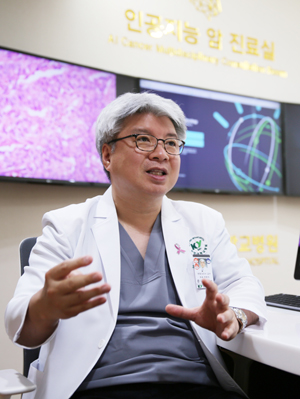The Watson fever has been waning among domestic medical institutions. Some are even skeptic about the usefulness of IBM’s artificial intelligence-powered software. Officials at Konyang University Hospital, however, see it differently.
The medical workers at Konyang University Hospital believe that Watson makes it possible for them to apply cutting-edge, precision medicine to different clinical fields. That explains why the hospital has recently adopted additional Watson programs. Konyang University Hospital aims to become one of the nation’s top hospitals that offer the latest and best cancer treatments.
Watson for Genomics analyzes genetic variations in 3 minutes, not 3 weeks
Konyang University Hospital adopted Watson for Genomics last month, which offers custom-made genetic treatment. The adoption of the new AI program came after about two years since the hospital adopted Watson for Oncology in April 2017.
Watson for Genomics is currently used in Hallym University Medical Center, Gachon University Gil Medical Center and Konyang University Hospital. Konyang University Hospital is the first among medical institutions in Chungcheong and Gangwon provinces to have adopted both Watson for Oncology and Watson for Genomics.
The additional adoption of Watson for Genomics has begun to produce synergic effects with the “next-generation sequencing (NGS),” which the hospital introduced in February, according to Konyang University Hospital officials.
Formerly, it took about two weeks to analyze data retrieved through NGS tests, but Watson for Genomics does it in two to three minutes. Moreover, it analyzes a vast amount of data, including the latest academic journals and drug levels, finding out 99 percent of confirmed mutations, the hospital officials said.
“It usually takes at least two to three weeks for doctors to gather, analyze NGS test results, and come up with appropriate treatments. In comparison, Watson for Genomics analyzes genetic variations and offers the latest and the most appropriate treatments within two to three minutes,” said Yoon Dae-seong, head of Konyang University Hospital Cancer Center. “It allows doctors to spend more time and focus on the treatment of patients.”
Professor Choi Jong-kwon of the hospital’s Hemato-Oncology Department stressed that Watson for Genomics is on a different level from Watson for Oncology.
“Critics used to say hospitals offer similar levels of treatment whether or not they adopted Watson for Oncology,” Choi said. “Watson for Genomics, however, is of a completely different level. It works as a navigator that pinpoints the target in the open sea. It is of great help for hemato-oncologists.”
The Konyang professor went on to say, “Watson for Genomics pinpoints certain types of cancer have been caused by specific mutations and offers up-to-second treatments on this planet.”

Localized and upgraded Watson
Watson for Oncology has also been upgraded in user-oriented ways.
The old Watson used to analyze bibliography and latest research papers to recommend treatments and attach evidentiary data, according to patients’ conditions. Although it organized and narrowed down a vast amount of data, its attachment was nearly 100 pages.
The upgraded Watson, however, visualizes its analysis and offers it in a single page so that the medical workers can quickly grasp the latest treatment trends. It also allows users to see source materials, as it did in the past.
The AI program has also been localized in ways to fit the nation’s medical environment better.
The Health Insurance Review & Assessment Service (HIRA) has recently added the data processed by Watson for Oncology to its payment criteria. It reflected the realistic limitations, as medical workers cannot prescribe the best treatment recommended by Watson if it is not included in HIRA’s payment criteria. Watson adopted by Korean medical institutions displays the reimbursement criteria in the Korean language by adding the HIRA category to its regional guideline.
The color code that had distinguished the “Recommended,” “For Consideration,” and “Not Recommended” also changed.
The “Recommended” treatment used to be displayed in green, “For Consideration” in orange and “Not Recommended” in pink. Officials in the clinical fields, however, have expressed concerns that the treatments displayed in green could be taken as the safe treatment and those displayed in orange and pink colors as relatively dangerous ones.
Moreover, the green-colored “Recommended” treatments often could not be applied because HIRA’s payment criteria restricted payments to them.
IBM thus decided to remove the color classification and distinguish treatments by marking them only in the letters of “Recommended,” “For Consideration,” and “Not Recommended.”
‘We want to give patients opportunity to choose best treatment’

Konyang University Hospital is more satisfied than ever with Watson. Officials are confident that the AI program will serve as a springboard for the hospital to overcome its limitations as a “regional university hospital.” Larger university hospitals in Seoul preferred by cancer patients may find it challenging to offer cutting-edge treatments using Watson, according to Konyang University Hospital officials.
“Big-Five hospitals attract not only patients but also medical personnel. Wide gaps are inevitable between such hospitals and regional university hospitals in terms of human resources. Watson, however, can narrow the gap,” Yoon said. “Genetic variations used to take two to three weeks, but Watson for Genomics does it in two or three minutes. That allows doctors to spend more time on treating patients. It also increases efficiency and accuracy.
Yoon emphasized that using AI in the clinical field is a trend of the times, which he said is why Konyang University Hospital does not spare investment in AI.
He said, “Times have changed. Doctors no longer work alone. Now, it is difficult to survive if we do not cooperate with the AI. That does not mean the AI is a magic wand, however. It only serves to help doctors perform precise treatments without making mistakes.”
Yoon added that it is Konyang University Hospital’s policy to establish safety nets and devices to prevent mistakes and errors.
“It is an investment for our patients’ safety and to keep up with the latest trends in medical treatment. Treatments using Watson are not eligible for insurance costs right now. It means that the hospital may even lose money instead of earning them. We, however, want our patients to have the opportunity to choose the best treatments,” Yoon said.
He went on to say, “Our bold investment is also our survival strategy. We need to invest so that our medical staff could improve their skills and our hospital survive the increasingly fierce competition.”
Professor Choi also stressed that it is necessary to keep up with updated information.
“Back in the farming days, advice from the oldest and most experienced man was mostly right,” he said. “These days, however, drones are used to sprinkle the exact amount of pesticides on farming fields. Times are changing fast, and you should not simply stick with the old way.”

